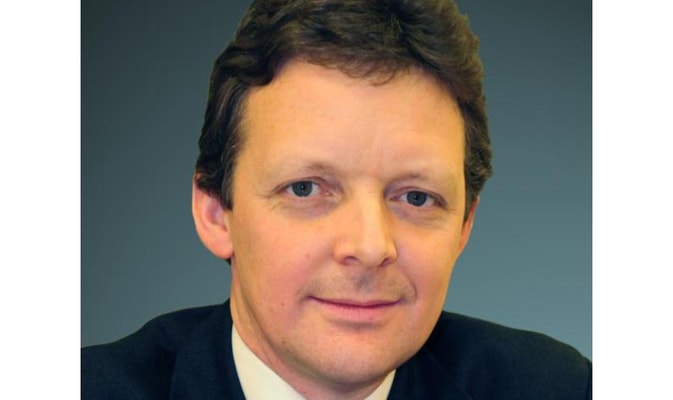Angus Parker, Global Equity Climate Change Fund Manager at HSBC AM

17 FEB, 2021
By Constanza Ramos

Angus has been working in the financial industry since 1993 and has been with HSBC Global Asset Management since 2004, based in London. He is responsible for managing the firms’ global equity portfolios including the HSBC GIF Global Equity Climate Change fund.
Prior to joining the firm in, Angus worked for Lazard Asset Management. Angus holds an MA degree from the University of Edinburgh and is an Associate of the Institute of Investment Management and Research (AIIMR).

Taking a brief look at your trajectory, what would you highlight about your professional career? Any advice for young people trying to be successful in the industry?
Starting as a small cap fund manager over 25 years ago was a lucky break which has really helped me in my career today. Smaller companies provide opportunities to witness and appreciate subtle aspects of how they operate more so than larger ones. Visiting them directly I was able to see a company’s values, culture and behaviour in action. There were opportunities to talk to different employees and customers, observe the state of factories for example and see how they were dealing with waste and discuss issues of governance. Today we refer to these issues as an ESG assessment but fundamental analysis has always been about questioning the sustainability of business models.
My second bit of luck has been working for a series of outstanding investors. You are fortunate if you work with such people and hope that some of their investing DNA rubs off on you. Much of my investment checklist today remains unchanged from those early experiences. Finally, the opportunity to work in both London and New York has been a big influence. Appreciating different investment perspectives and techniques is central to a balanced understanding of how investment markets operate and evolve.
Managing money for clients is a huge responsibility and my advice to young people in the industry is to take every opportunity to meet their customers. By sitting across the table from them, you are reminded, like no other way can, about why what you are doing matters. Communicating with clients reminds you that whilst investing may be a fantastic job, for you it is a critical professional service for your clients.
What is the greatest challenge as a Fund Manager?
Emotional stability and keeping calm under pressure. Fund managers often exaggerate their ability to influence short-term portfolio outcomes when in reality randomness can play a far greater role. Whilst investment process inputs can be controlled, portfolio outputs are a function of a multitude of uncontrollable variables, not least the impact of a whole range of market participants with widely divergent frames of reference, goals and time horizons. Absorbing resultant portfolio volatility without getting unduly impacted is a key skill.
Emotional stability is about not getting too down when the portfolio is underperforming but equally not getting too carried away when things seem to be going well. Decision making under emotional duress is a recipe for disaster and can make colleague and client interactions very difficult. The investment profession attracts many of the brightest graduates from universities and colleges but this is no guarantee of success. Often the missing ingredient is around emotional stability with the best fund managers able to absorb the rough with the smooth.
What is your advice to investors, how should they position themselves within the current environment?
We currently see ourselves in the restoration phase of the economic cycle with activity below pre-Covid levels everywhere, with the exception of China. The pace of recovery will depend on geography, successful delivery of the vaccines and continued policy support. In some laggard economies there is scope for a cyclical catch up in 2021. High unemployment rates, stressed corporate balance sheets and fragile confidence underpin the need for ongoing policy support.
There seems little risk of inflation in the short term.
Following the rapid rally in 2020 prospective risk-adjusted returns for many asset classes have fallen but an allocation to equities still makes sense. Equity investments should always be seen as long term in nature allowing compounding to work its magic. Given the existential threat that greenhouse gas accumulation in the atmosphere presents, an allocation to a climate change fund seems a good way of ensuring that generations to come have somewhere to invest in the future.
Which parameter do you value most when selecting companies for your fund?
Resilience is something we value above all else in our holdings. The capacity to cope with disruption is a powerful force. Perhaps the greatest advantage that equity has as an investment asset is its ability to compound returns over time. Companies whose business model allows them to endure across the decades enable this to happen – resilience is central. Resilience also enables decisions, whether they be tactical or strategic, to be taken from a position of strength. There will be business cycles to navigate, technological challenges to face and competition to resist.
However, if the company is founded on a distinctive value proposition for its customers and is able to reinvest behind that then it will endure successfully. Of course, it also needs to maintain an appropriate balance sheet and ability to generate cash, while at the same time appealing to a diversified customer base and avoid becoming over dependent on a limited number of suppliers. The seeds of resilience are sown in the values, culture and behaviour of organisations. It is their actions and behaviour towards the competing interest of different stakeholders that is most instructive. Companies do not exist in a vacuum and so ensuring that no stakeholders are exploited is key to resilience.
Could you share a few details about the investment process for the HSBC GIF Global Equity Climate Change fund you manage?
The HSBC GIF Global Equity Climate Change fund has a thematic focus on climate change whilst also achieving a lower carbon footprint and higher ESG score than the broader global equity market. Central to addressing climate change is achieving a successful energy transition and decarbonisation process for the global economy. It is worth remembering that just as climate change stems from many sources so too must its solutions.
There need to be fundamental changes in energy production, food, land and agriculture, industrial processes, buildings, transportation and many other aspects of modern life. Solutions exist to this daunting but unavoidable challenge but require a fundamental rewiring of the global economy.
We have identified nine sub themes through which to address this challenge ranging from renewable energy and energy efficiency to clean transportation and natural capital. All of our holdings are focused on one of the sub themes, each of which we believe can have a material impact on reducing the build-up of greenhouse gases. Potential investments are screened for alignment with the theme and their carbon footprint and ESG score are checked. Rigorous business model analysis is conducted on each name including extensive stakeholder due diligence where detailed ESG assessment takes place. Once we are satisfied that the company has an enduring business model and a sustainable growth path the company’s stock is available for inclusion in the portfolio. Holdings are diversified geographically and by sub theme exposure with stocks in both developed and emerging markets and in all nine sub themes.


